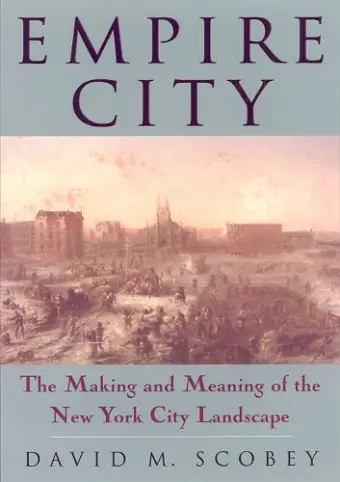Empire City
The Making And Meaning Of
Format:Paperback
Publisher:Temple University Press,U.S.
Published:30th Sep '03
Currently unavailable, and unfortunately no date known when it will be back

This insightful exploration reveals how Empire City captures the essence of New York's transformation and its dual nature of urban life, showcasing both its grandeur and challenges.
When people refer to 'New York', they are often thinking of Manhattan, an island characterized by a mix of bustling commercial areas and quiet residential neighborhoods. This densely populated area is home to towering skyscrapers and humble tenements, where wealth and poverty coexist in close proximity. Empire City delves into the dreams that have shaped the city's evolving landscape and highlights the persistent challenges that remain unresolved.
For generations, New Yorkers have humorously remarked on the city's relentless cycle of demolition and construction. This ever-changing metropolis captures the attention of the world, as it continuously reinvents itself. The transformation of New York from a compact port to a sprawling modern city took place during the mid-nineteenth century, and Empire City chronicles this fascinating journey. Author David Scobey offers a vivid portrayal of the city's uneven development, illustrating how the process of city-building has been driven by both meticulous planning and speculative ventures.
Through the lens of notable landmarks such as Central Park and the Brooklyn Bridge, Empire City contextualizes these iconic sites within the broader narrative of urban design and the politics surrounding city planning. While the ambitious efforts to guide growth and address urban issues may have faced limitations, they continue to inspire and engage the imagination. Scobey's insights prompt readers to consider how New York City embodies the complexities of urban life, representing both its triumphs and tribulations.
"Exhaustively researched, beautifully written, and powerfully argued... Empire City will influence the theories and histories of urban geographers, historians, sociologists, and cultural theorists alike."-George Chauncey, University of Chicago, author of Gay New York "Lucidly written, deeply researched and thought through, Empire City zooms to the front rank of books about nineteenth century New York. Scobey examines the way real estate boosters, visionary reformers, business elites and Tammany politicos reshaped Gotham's cityscape, for good and ill. His analytical approach both illuminates a particular era, and provides a powerful general model for examining other times, other places."-Mike Wallace, co-author of Pulitzer-Prize winning Gotham: A History of New York "What made New York? In David Scobey's deft and deeply meditated account, it is not the blind forces of modernization nor the overarching will of an Haussman, but the complex interplay of interests, values and ideas-and above all the grandiose city-and nation-building aspirations of the 'bourgeois urbanists' of the 1860s and 70s. Scobey's New York is both a supremely self-conscious project-a 'mission civilatrice,' as he writes-and the battleground for the conflicting political, economic and social ambitions of an emergent world-city. This is a book for anyone who cares about cities-their future as well as their past."-James Traub, contributing writer for The New York Times Magazine and author of City On A Hill: Testing The America Dream At City College "Scobey has written a brilliant, evocative account of New York on the brink of economic and social chaos."-Journal of American History "Scobey's study is a significant contribution to literature in several fields... Perhaps most useful is Scobey's willingness to employ the lens of political economy to dissect the process of urbanization."-History: Review of New Books "It is best to treat [the book] not as a work of urban theory, but as a powerfully written (and very well illustrated) analysis of the specificities of class formation, class conflict and urban culture in the making of modern Manhattan."-Cultural Geographies "The most important achievement of David M. Scobey's study of New York city building and city planning in the 1860s and 1870s lies its combination of serious attention to political economy and culture."-The American Historical Review "If there were any concern that Scobey might not fire the imagination like a feature film, I can assure you that Scobey does his best not to disappoint. The book is lavishly illustrated with sumptuous prints of the New York landscape [which] add to the atmosphere created by Scobey's warm and relaxed writing style."-Environment and Planning
ISBN: 9781592132355
Dimensions: 254mm x 178mm x 23mm
Weight: unknown
352 pages